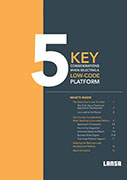
Never in the history of IT have developers been expected to support such a vast array of technologies – cloud, mobile devices, security, performance, multiple user interfaces, databases, servers and more. As a result, development time has become excessively long, extending application backlogs week after week.
In addition, many legacy systems are too rigid to adapt to modern technology.
Because of this, IT executives are now investigating low-code platforms as a new approach for application development.
The most effective way to achieve all the promises of low-code is to know what to look for when exploring your options.
In this white paper, we discuss the five key considerations when selecting a low-code platform for your development team. You’ll learn why it’s worth taking the time to investigate a low-code vendor’s:
- Application Framework – the best low-code development platforms will rapidly assist in the prototyping, design and deployment stages of creating web and mobile applications.
- Integration – the success of any low-code platform relies on its ability to integrate with anything and everything, whether the objects are in the cloud, on-premises or on a local device, server or workstation.
- Unlimited Depth and Reach – when it comes to building, maintaining and extending applications, the best low-code platforms never require developers to leave the low-code environment.
- Business Rules Engine – high-end low-code platforms include a Business Rules Engine as part of its solution that allows you to define a rule once and know it will be enforced everywhere.
- True Cross-Platform Support – a low-code platform should possess many deployment options as well as a migration path to easily port applications over to a different technology stack.
